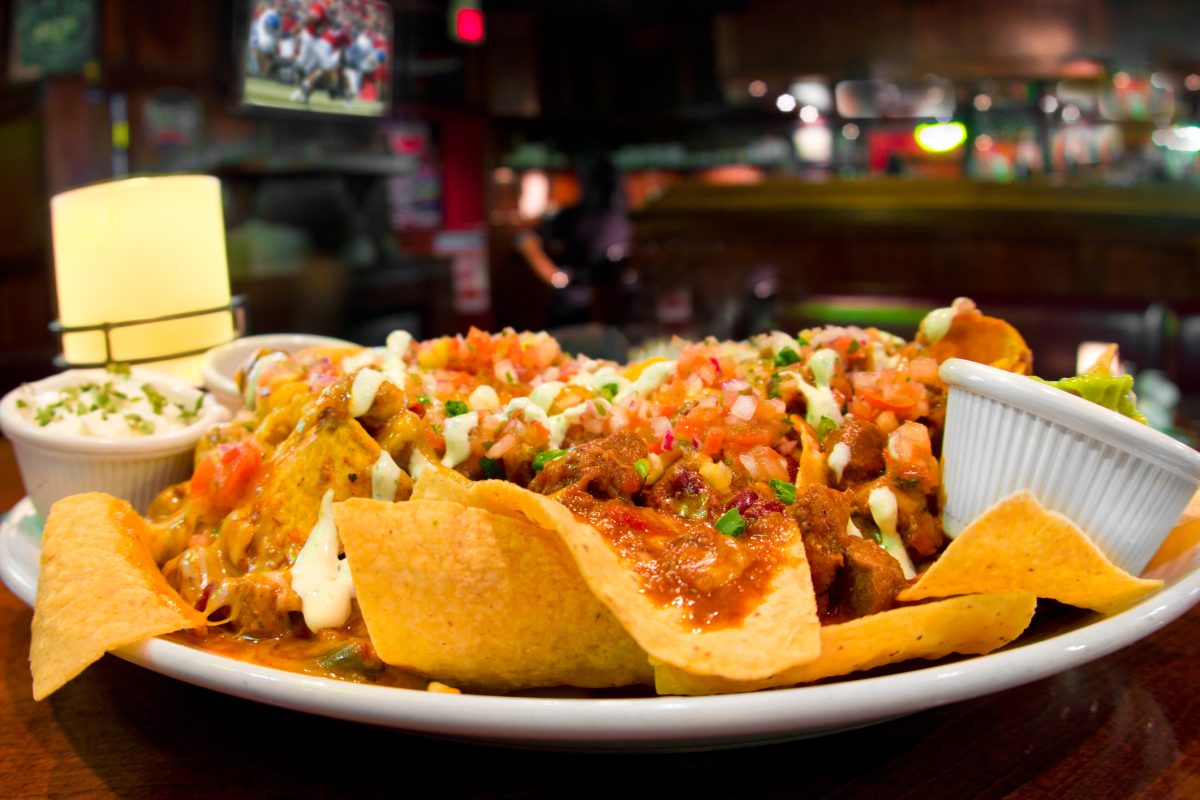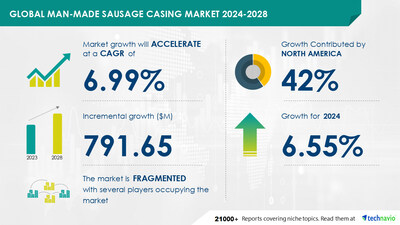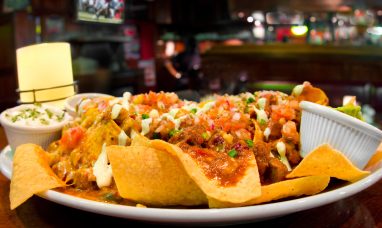NEW YORK, Dec. 11, 2024 /PRNewswire/ — Report with the AI impact on market trends – The global man-made sausage casing market size is estimated to grow by USD 791.65 million from 2024-2028, according to Technavio. The market is estimated to grow at a CAGR of 6.99% during the forecast period. Increasing household consumption of processed meat is driving market growth, with a trend towards rising number of organized retail outlets that offer processed meat products. However, increasing frequency of animal disease outbreaks poses a challenge. Key market players include Almol Australiasia Casings pl, Biostar Co., Blancasings Industriale SRL, BSA Wiberg, Colpak, Danish Crown AS, FABIOS S.A., Fibran Group, Globe Packaging Inc., Kalle GmbH, LEM Products, Oversea Casing Co., PODANFOL S.A., SARIA International GmbH, SELO BV, Viscofan SA, Viskase Companies Inc., ViskoTeepak Holding Ab Ltd., Waltons, Weschenfelder Direct Ltd., and Nippi Inc..
Key insights into market evolution with AI-powered analysis. Explore trends, segmentation, and growth drivers- View Free Sample PDF
|
Man-made Sausage Casing Market Scope |
|
|
Report Coverage |
Details |
|
Base year |
2023 |
|
Historic period |
2018 – 2022 |
|
Forecast period |
2024-2028 |
|
Growth momentum & CAGR |
Accelerate at a CAGR of 6.99% |
|
Market growth 2024-2028 |
USD 791.65 million |
|
Market structure |
Fragmented |
|
YoY growth 2022-2023 (%) |
6.55 |
|
Regional analysis |
North America, Europe, APAC, South America, and Middle East and Africa |
|
Performing market contribution |
North America at 42% |
|
Key countries |
US, Canada, China, Germany, and UK |
|
Key companies profiled |
Almol Australiasia Casings pl, Biostar Co., Blancasings Industriale SRL, BSA Wiberg, Colpak, Danish Crown AS, FABIOS S.A., Fibran Group, Globe Packaging Inc., Kalle GmbH, LEM Products, Oversea Casing Co., PODANFOL S.A., SARIA International GmbH, SELO BV, Viscofan SA, Viskase Companies Inc., ViskoTeepak Holding Ab Ltd., Waltons, Weschenfelder Direct Ltd., and Nippi Inc. |
Market Driver
The man-made sausage casing market is witnessing significant trends in response to changing consumer preferences and dietary trends. Sausage links made with ground beef continue to be popular, but there’s a growing demand for lower-fat and seasoned fillers. Natural casings from pig intestines and animal collagen, including cow and pig skins, are being replaced by artificial casings like cellulose, collagen, plastic, and fibrous materials. Hygienic benefits and microbial contamination concerns are driving the shift towards man-made casings. With the rise of plant-based diets, vegan sausages made with plant-based materials like cellulose, collagen, and whey proteins are gaining traction. Food retailers and foodservice chains are catering to this demand, offering a variety of vegetarian and vegan sausage casings. Animal welfare and ethical concerns are influencing the market, with some consumers opting for plant-based diets due to animal cruelty concerns. Healthy lifestyles and vegetarianism are also driving the demand for natural and GMO-free casings. Automation and consistent quality are essential for food manufacturers producing processed meat products, including animal-based and plant-based sausages, for on-the-go consumption. Public health risks associated with processed meat products and the rise of plant-based diets are impacting global meat consumption and production. The man-made sausage casing market is adapting to these trends, offering a range of casings for both animal-based and plant-based sausages. From collagen-based casings to fermented sausage, net casings, and textile casings, the market is diverse and evolving to meet the needs of consumers.
The man-made sausage casing market has experienced significant growth due to the increasing demand for processed meat from quick food establishments and households. Supermarkets, as organized retailers, have capitalized on this trend by offering a wide range of processed meat products, including sausages, hot dogs, salami, bacon, and ham. These convenient options save time and money for both restaurants and households. Additionally, the proliferation of supermarkets globally has made it more convenient for consumers to shop for various household items in one place, leading to their growing popularity.
Request Sample of our comprehensive report now to stay ahead in the AI-driven market evolution!
- The man-made sausage casing market faces several challenges in the modern food industry. Sausage links made from ground beef, fat, seasoning, and fillers require casings for proper shaping and cooking. Traditional casings like pig intestines and cow skins have hygienic benefits but raise concerns over animal cruelty and microbial contamination. Artificial casings from cellulose, collagen, plastic, and other materials offer solutions. Collagen casings, derived from animal collagen, are popular due to their premium image and consistent quality. However, vegetarian and vegan consumers demand plant-based alternatives, leading to the development of casings from plant-based materials like cellulose, fibrous casings, and even whey proteins. Food retailers, foodservice chains, and supermarkets catering to diverse diets and lifestyles require various types of casings. These include vegan sausage casings, net casings, and textile casings. Processed meat products, convenience foods, and ready-to-eat items demand automation for efficient production and consistent quality. However, challenges persist in ensuring GMO-free and gluten-free casings, as well as addressing public health risks associated with processed meat consumption. The market continues to evolve with the growing popularity of plant-based diets, fermented sausages, and natural casings like alginate casings.
- The man-made sausage casing market faces a significant challenge due to the rising prevalence of animal diseases during the forecast period. Diseases such as foot-and-mouth disease, rinderpest, fowl plague, rift valley fever, swine vesicular disease, bovine spongiform encephalopathy, contagious bovine pleuropneumonia, pneumovirus, porcine circovirus 2, porcine reproduction and respiratory syndrome, and avian influenza restrict the use of livestock and poultry in manufacturing sausage casings. Animals infected with these diseases carry harmful substances like hormones, microorganisms, dioxins, anti-microbial drugs, and chemicals that can pose health risks to consumers. Therefore, the man-made sausage casing market’s growth may be impeded due to the increasing incidence of animal diseases.
Discover how AI is revolutionizing market trends- Get your access now!
This man-made sausage casing market report extensively covers market segmentation by
- End-user
- 1.1 Household
- 1.2 Industrial
- Type
- 2.1 Collagen casing
- 2.2 Cellulose casing
- 2.3 Fibrous casing
- 2.4 Plastic casing
- 2.5 Others
- Geography
- 3.1 North America
- 3.2 Europe
- 3.3 APAC
- 3.4 South America
- 3.5 Middle East and Africa
1.1 Household- The man-made sausage casing market has experienced significant growth due to the increasing consumption of processed meat in households. With urban populations growing and busy work schedules, the convenience of quick-to-prepare processed foods, such as sausages, has become increasingly popular. The Millennial population’s interest in cooking also contributes to the demand for man-made sausage casings. Collagen and cellulose casings are commonly used in households. Furthermore, the availability of man-made sausage casings on e-commerce platforms like Amazon.com has expanded market reach and sales. These factors are expected to continue driving the growth of the global man-made sausage casing market over the forecast period.
Download a Sample of our comprehensive report today to discover how AI-driven innovations are reshaping competitive dynamics
The man-made sausage casing market encompasses a variety of materials used to encase and preserve different types of sausages. Sausages can be made from links of ground beef, seasoned with herbs and spices, filled with fat and other ingredients, and encased in natural or artificial casings. Traditional casings include pig intestines, but artificial options like cellulose, collagen, and plastic are also popular. Global meat consumption and production drive demand for sausage casings, with sausage manufacturers, foodservice chains, and supermarkets as key buyers. Vegetarian sausages require plant-based casings, while public health risks associated with plastic and textile casings are a concern. Collagen-based casings, alginate casings, and net casings are alternative options. Convenience foods and ready-to-eat products also contribute to market growth. Fermented sausages, like salami and chorizo, often use natural casings, while artificial casings are more common for fresh and cooked sausages.
Man-made sausage casings have gained significant popularity in the food industry as an alternative to traditional animal casings. These casings are made from various materials such as collagen, cellulose, plastic, and plant-based materials like fibrous casings, net casings, and even textile casings. Sausage links can be filled with ground beef, fat, seasoning, and fillers to create a wide range of sausage types. The use of man-made casings offers several advantages, including hygienic benefits, reduced risk of microbial contamination, and consistency in quality. Collagen casings, derived from animal collagen, are a popular choice for those who prefer natural sausage casings but do not consume pig intestines or cow skins. As dietary trends shift towards plant-based diets, vegan sausages have gained traction, leading to the development of vegetarian sausage casings made from materials like cellulose, collagen, and plant-based proteins like whey. This shift is driven by concerns over animal cruelty, healthier lifestyles, and ethical considerations. Food retailers, foodservice chains, and supermarkets offer a wide range of man-made sausage casings to cater to diverse consumer preferences. The global meat production and consumption continue to rise, driving the demand for man-made sausage casings in processed meat products, ready-to-eat products, and convenience foods. Automation in the production of man-made sausage casings ensures consistent quality and reduces the need for artificial additives. The market for man-made sausage casings is expected to grow as consumers seek premium image, consistent quality, and diverse options in their food choices. However, concerns over public health risks associated with processed meat products and the environmental impact of livestock production may influence the market’s growth.
1 Executive Summary
2 Market Landscape
3 Market Sizing
4 Historic Market Size
5 Five Forces Analysis
6 Market Segmentation
- End-user
- Household
- Industrial
- Type
- Collagen Casing
- Cellulose Casing
- Fibrous Casing
- Plastic Casing
- Others
- Geography
- North America
- Europe
- APAC
- South America
- Middle East And Africa
7 Customer Landscape
8 Geographic Landscape
9 Drivers, Challenges, and Trends
10 Company Landscape
11 Company Analysis
12 Appendix
Technavio is a leading global technology research and advisory company. Their research and analysis focuses on emerging market trends and provides actionable insights to help businesses identify market opportunities and develop effective strategies to optimize their market positions.
With over 500 specialized analysts, Technavio’s report library consists of more than 17,000 reports and counting, covering 800 technologies, spanning across 50 countries. Their client base consists of enterprises of all sizes, including more than 100 Fortune 500 companies. This growing client base relies on Technavio’s comprehensive coverage, extensive research, and actionable market insights to identify opportunities in existing and potential markets and assess their competitive positions within changing market scenarios.
Technavio Research
Jesse Maida
Media & Marketing Executive
US: +1 844 364 1100
UK: +44 203 893 3200
Email: [email protected]
Website: www.technavio.com/
![]() View original content to download multimedia:https://www.prnewswire.com/news-releases/man-made-sausage-casing-market-to-grow-by-usd-791-65-million-2024-2028-driven-by-processed-meat-demand-and-ai-driven-market-transformation—technavio-302327901.html
View original content to download multimedia:https://www.prnewswire.com/news-releases/man-made-sausage-casing-market-to-grow-by-usd-791-65-million-2024-2028-driven-by-processed-meat-demand-and-ai-driven-market-transformation—technavio-302327901.html
SOURCE Technavio

Featured Image: Megapixl @ Littleny

















